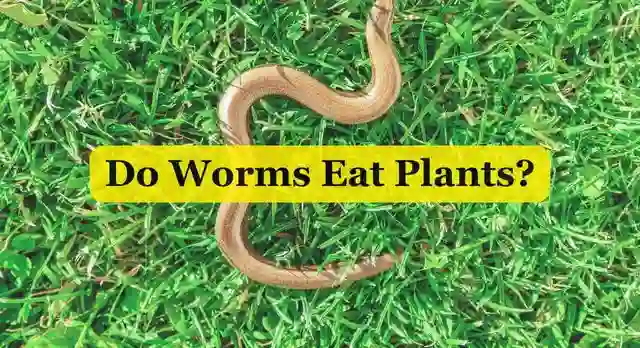Do Worms Eat Plants? Relationship Between Worms and Vegetation
Have you ever wondered if worms eat plants? The thought of these slimy creatures munching on your beloved garden greens might raise some questions. In this article, we will delve into the intriguing world of worms and their interaction with plants. So, put on your gardening gloves and join us on this exploration of the complex relationship between worms and vegetation.

Do Worms Actually Eat Plants?
While worms do consume plant material, they primarily feed on the decomposing organic matter surrounding plants rather than actively grazing on living vegetation. Their diet consists of dead leaves, decaying roots, and other plant debris found in the soil. Worms indirectly benefit plants by breaking down this organic matter, enhancing nutrient availability, and improving soil conditions for root growth.
The Benefits of Worms for Plants
While worms may not directly consume live plants, their presence and activities in the soil offer several benefits for plant growth and overall garden health:
- Nutrient Cycling: Worms break down organic matter, releasing nutrients back into the soil. This nutrient cycling process enriches the soil and makes essential elements more accessible to plants.
- Soil Aeration: As worms tunnel through the soil, they create channels that improve air circulation and oxygenation. Adequate oxygen levels in the soil promote root respiration and nutrient uptake.
- Enhanced Soil Structure: Worms help improve soil structure by burrowing and creating passageways. These tunnels allow for better water infiltration, root penetration, and the movement of beneficial microorganisms.
- Increased Water-Holding Capacity: Worm burrows improve the soil’s ability to retain water, reducing the risk of waterlogging and increasing drought resistance in plants.
Promoting a Harmonious Relationship Between Worms and Plants
To foster a positive interaction between earthworms and plants in your garden, consider implementing the following practices:
Mulching: Apply organic mulch around plants to provide additional organic matter for worms to feed on. This also helps conserve moisture and suppress weed growth.
Composting: Set up a composting system and add plant-based kitchen scraps and yard waste. The resulting compost will attract worms and provide a nutrient-rich food source.
Avoid Chemicals: Minimize the use of synthetic fertilizers, pesticides, and herbicides. Chemicals can harm worms and disrupt the delicate balance of the soil ecosystem.
Maintain Organic Matter: Incorporate compost or well-rotted manure into the soil to increase organic matter content. This creates a favorable environment for worms and promotes plant growth.
Read more – what does an earthworm eat
Key Takeaway
While earthworms may not directly feed on living plants, their presence and activities have a positive impact on plant health and soil fertility. Worms contribute to nutrient cycling, soil aeration, and improved soil structure, benefiting plant growth and overall garden vitality. By creating a worm-friendly environment through organic practices, composting, and minimizing chemical use, you can encourage the presence of worms and promote a thriving garden ecosystem. Embrace the hidden helpers beneath the soil, and witness the remarkable difference they make in nurturing your plants.
Related Article
Do worms eat plants directly?
Worms primarily feed on decomposing organic matter, such as dead leaves and decaying roots, rather than actively consuming live plants.
What do worms eat in relation to plants?
Worms feed on organic materials surrounding plants, including decaying leaves, dead roots, and other plant debris found in the soil. They indirectly benefit plants by breaking down this organic matter, improving soil conditions and nutrient availability.
How do worms contribute to plant growth?
Worms play a vital role in nutrient cycling, soil aeration, and soil structure improvement. By breaking down organic matter and releasing nutrients back into the soil, worms enhance nutrient availability for plants. Their tunneling activities also promote aeration, root penetration, and the movement of beneficial microorganisms.
Can worms help with nutrient recycling for plants?
Yes, worms are important contributors to nutrient recycling. As they consume organic matter, worms break it down into smaller particles and release nutrients back into the soil through their castings. These nutrient-rich castings enrich the soil and make essential elements more accessible to plants.
